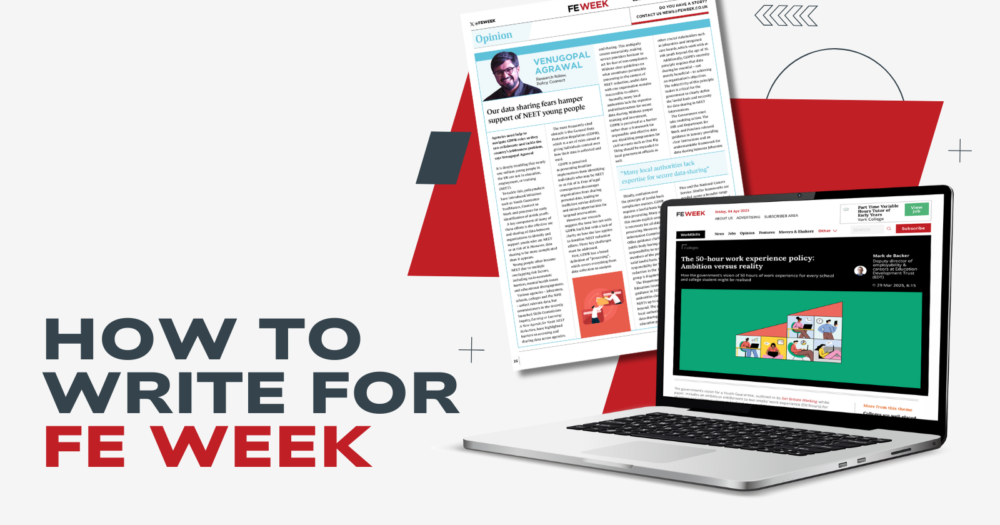Getting published in FE Week is your chance to share insights, spark debate and influence thinking in the further education and skills sector.
If you have strong opinions on policy, a new idea to share or a fresh perspective on the big issues in education, training or apprenticeships, we want to hear what you have to say.
You don’t have to be a CEO or senior leader to write for FE Week. In fact, our Staffroom column is reserved exclusively for teaching and non-teaching professionals on the front line. We’d love to hear from students and apprentices too.
This guide will walk you through the essentials to getting your voice heard across the sector.
Find your crowd, make your pitch
Our readers span all the different types of provision, providers and occupations across further (and some higher) education, so if you think your idea may be too niche, it probably isn’t.
We welcome pitches on funding, curriculum, teaching and learning, assessment, student support and everything in between. All we ask is that what you want to write is about, or concerns, learners, staff, leaders and/or providers in the sector.
When you pitch your idea, search our website to see what’s already been written on that theme to make sure your angle brings something new to the table. That will also give you a feel for how to write your piece.
Your pitch can be a brief outline or a first draft.
We love reaction pieces too, so approach us with your insight and expertise as soon as you can following significant news affecting the sector.
Contact details for our commissioning editor are at the end of this guide.
Promoting diverse voices
FE Week is committed to being a platform for everyone in the sector. Staff and students come from all backgrounds, and we want to showcase that diversity on our pages.
If you’re a group or organisation, when deciding who should write a piece, please consider authors from underrepresented groups.
Writing essentials
We know our sector is littered with jargon, but do your best to avoid.
Your article should read as though you’re having a lively and insightful discussion with friends over dinner. We’re not an academic journal. This ensures a good read and that your points and arguments are accessible.
Your word count will be 600-650 words. If you do go slightly over, we will edit it down and run the new version by you before publishing. Give your piece a re-read just before you send it to us to make sure you’re not using your precious wordcount repeating, restating or reiterating.
To make our Friday editions, your deadline is Monday. That will give us plenty of time to work together on edits. Don’t be alarmed or offended if we send you a list of edits to consider.
Try starting your article with a line that grabs the reader’s attention and sets the scene for the rest of the piece.
If you’re writing about a topic we’ve covered, you can include a link to a news story or another opinion piece. You can also add a couple of external links if you, for example, reference some research.
You’ll also need to send us a recent and unfiltered headshot, along with your name, job title, organisation and any social media handles we can use to promote your piece once it’s published.
By all means, use AI tools for research or to rephrase a sentence or two if you’re stuck. Don’t use it for whole chunks of copy though. The essence of a good op-ed lies in its authenticity, which gets lost when readers spot the tell-tale signs of AI-generated copy. Please don’t be offended if we send your piece back for rewrites.
Bill payer’s permission
We know that professionals working in the sector are teaming with great ideas. It’s that front-line wisdom we know our readers love to read, share and discuss with colleagues.
As much as we advocate a free and fair exchange of ideas, we know that providers will sometimes have policies around staff getting published in the media.
It is your responsibility to get any clearance or approval before you file your piece with us.
Style guide
For consistency, we lower case most things. Use lowercase letters for curriculum subjects (eg level 3 engineering diploma), the names of policy reforms (eg apprenticeship levy) and job titles (even the prime minister).
Organisations, acronyms and certain qualifications (eg Ofsted, BTEC, T Level) can be upper case.
In most cases, we’ll handle style for you in the editing process.
You have to pay for adverts
Opinion is free; overt product sales pitches from suppliers are not (click here for our competitive advertising packages).
Finally, we won’t accept a piece that has been published elsewhere. If you or your organisation wish to republish your FE Week piece somewhere else, please check with us first.
Let’s get started
Please send your pitch to FE Week’s commissioning editor, Jessica Hill.













